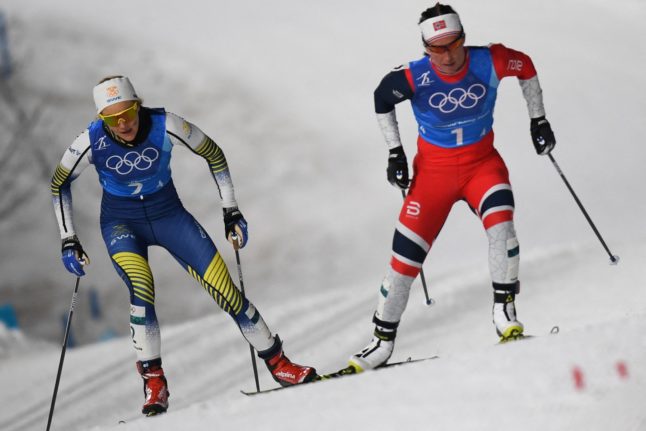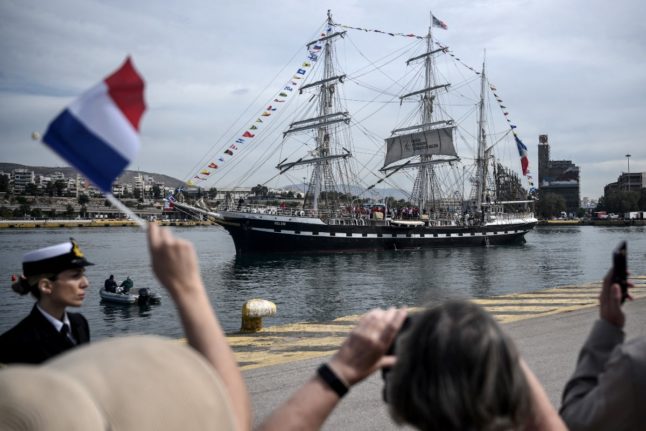The head of the French Olympic Committee David Lappartient and the Alpine regional president Renaud Muselier have formally presented France’s bid – with the headline being a promise that the Games would be 95 percent based on existing sites.
READ ALSO France sets out stall for 2030 Winter Olympics bid
Where would it be held?
Until the formal announcement this week, it wasn’t entirely clear. When the presidents of the Auvergne-Rhône-Alpes and Provence-Alpes-Côte d’Azur regions went to Paris this week, the details had been kept firmly under wraps.
Now, we know that the Olympic village will be in Nice, as will the international media centre and indoor skating events. At first glance, the coastal resort may seem an unlikely host city – but its mountain-to-sea location is such that, so the local boast goes, visitors can ski in the morning and swim in the Med in the afternoon…
Skiing events will naturally be in the mountains, mostly in the département of Haute-Savoie.
Ski resort Meribel-Courchevel would host alpine skiing events; Isola 2000, a 90-minute drive from Nice, would host the snowboard competitions; and Grand-Bornand is earmarked for the Nordic events.
Are there any rival bids?
Sweden and Switzerland have both put forward bids to host the Games. Salt Lake City, USA, also has a bid in, but it wants the 2034 Games, and is the only host in the running, so it seems likely they will get that when the hosts for both the 2030 and 2034 Games are announced next summer.
How much will it cost?
The bid sets the budget at €1.5 billion – much lower than the initial figure for the 2024 Olympics in Paris – and officials have said that they are determined not to allow any over-run on that figure.
“We will trim down this budget,” Lappartient, who is also head of the International Cycling Union, said. “The world is changing and we need to change too, there is no room for white elephants.
“As with Paris, we are seeking a durable legacy on viable economic terms to reflect the changing world.”
What about the environmental impact?
The plan is to host “the first sustainable winter Olympics” and that’s mostly about not building new sites.
The bid says that 95 percent of the required sporting infrastructure for the Games is already in place – many of them sites that were built for previous Winter Olympics hosted in France.
The only big new project that is envisioned is an Olympic-standard ice rink in Nice to host ice-skating events.
And the idea of using existing sites is one that the Paris 2024 summer Olympics team are also using – almost all of next summer’s events will take place in pre-existing venues with only the aquatics centre and the athletes village built from scratch.
How many times has France hosted the Winter Olympics?
France has hosted the Winter Games three times – at Chamonix in 1924, Grenoble in 1968 and Albertville in 1992.
How likely is France’s bid to win?
It has a good shout. The IOC was reportedly keen on a French bid even before the Auvergne-Rhône-Alpes and Provence-Alpes-Côte d’Azur bid was first announced in July, after French International Olympic Committee member Guy Drut suggested the two mountain areas may consider running.
“We have a great chance of winning because of our skiing facilities. We have political backing on a regional level and from the president of France,” said Muselier at the bid’s unveiling.
The same does not appear to be true of the two main rival bids for the 2030 Games. Switzerland has not hosted a Winter Olympics since Saint-Moritz 1948; and Sweden is yet to host a Games. It was unsuccessful with a bid for the 2026 Winter Games, losing out to Milan and Cortina.
And it seems that enthusiasm for the event is on the wane in both countries. Reports suggest the Swiss bid may face a referendum vote, while the failure of the 2026 bid has hit Swedish confidence.
When is a decision due?
The bids are due to go before a meeting of the IOC executive this month, but a final vote – on the hosts for both the 2030 and 2034 Games – is not expected before July 2024.



 Please whitelist us to continue reading.
Please whitelist us to continue reading.
Member comments